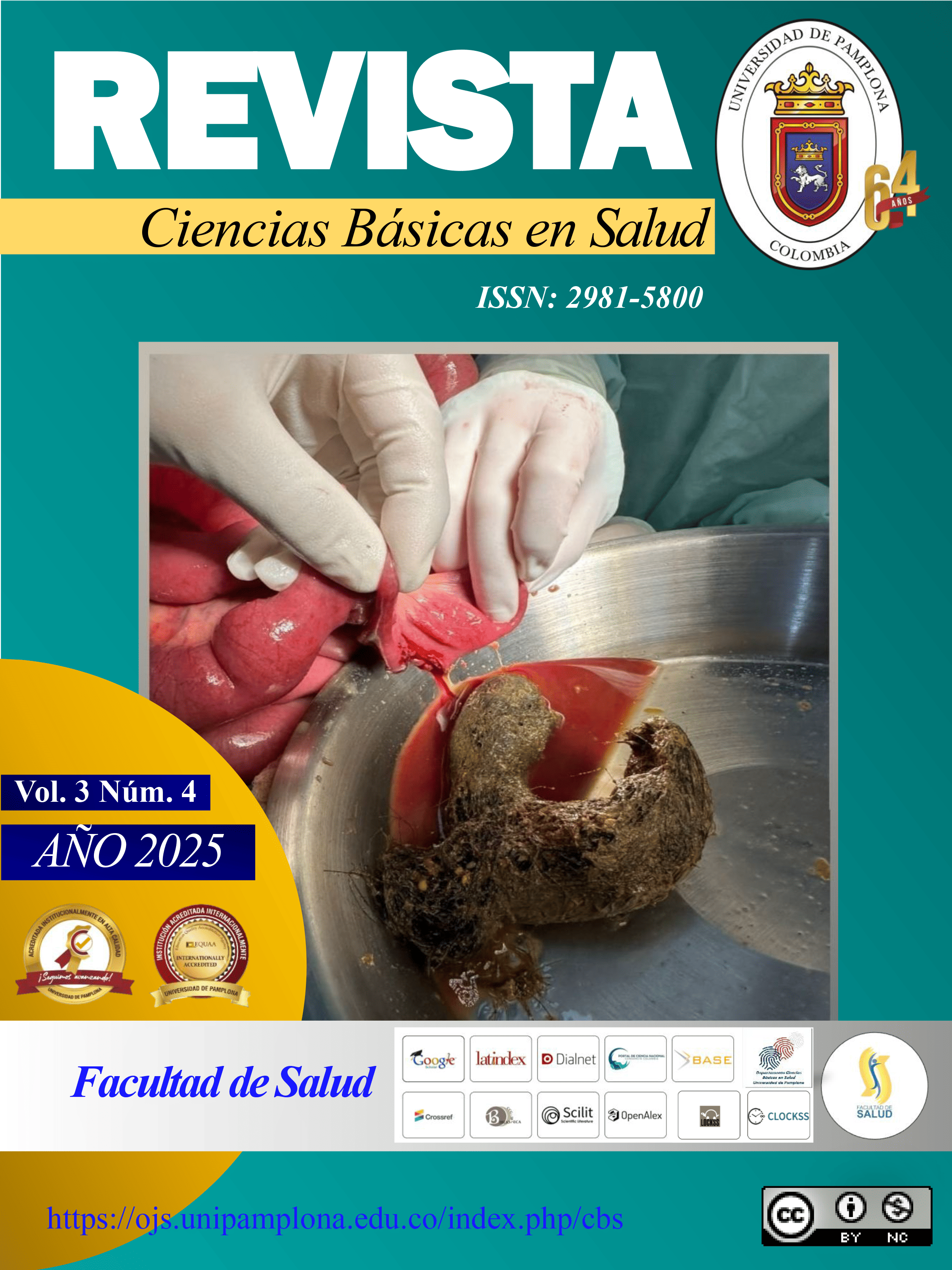Body awareness and occupational adaptation in recyclers
DOI:
https://doi.org/10.24054/cbs.v3i4.4248Keywords:
body awareness, occupational adaptation, occupational performance, occupational therapy, working conditions, recyclingAbstract
This research was conducted at a recycling company in Pamplona, Norte de Santander. Its main objective was to determine the influence of body awareness on the occupational adaptation of recyclers in Pamplona through a quantitative study, promoting efficiency in the performance of occupational tasks. The theoretical framework was based on theories from the discipline of occupational therapy, recognizing that adaptation depends on the individual’s ability to adjust to environmental demands and that performance occurs as a result of the interaction between the person, their contexts, and the tasks they perform. A descriptive quantitative approach with a cross-sectional design was used. The instruments applied were a sociodemographic questionnaire, the MAIA-II for body awareness, and the OPHI-II for occupational adaptation. The data were processed using SPSS version 23. The results showed that high perceptual dimensions (Perception and Emotional Awareness at the ninetieth percentile) do not exert a protective influence on occupational adaptation. Conversely, low regulatory dimensions (Avoiding Distractions, Attention Regulation, and Body Listening at the fortieth percentile) exert a significant negative influence on occupational identity and competence. The Emotional Awareness subscale showed a significant association with problems in Occupational Identity, with an odds ratio equal to four point zero and a ninety-five percent confidence interval ranging from one point zero two to fifteen point nine three, and a p value lower than zero point zero five. For Occupational Competence, two subscales showed significant associations: Emotional Awareness, with an odds ratio of twenty-eight point seventy-five, and Avoiding Distractions, with an odds ratio of zero point one three four. In the Occupational Context scale, the pattern was identical to that observed in Occupational Competence, since the same contingencies underlie the work environment. Across the three scales, odds ratios greater than four point zero and statistical significance were observed in all cases. It is concluded that body awareness exerts a paradoxical influence on occupational adaptation. In contexts of extreme precarity, high interoceptive perception without self-care actions intensifies the conflict between bodily needs and work demands.
Downloads
References
Alvarado Puentes, J. C., Laverde García, K., & Narváez Esteban, J. D. (2024). La importancia del reconocimiento y la conciencia corporal en la formación de la Básica Primaria.
Ángel, M. C. (2023, agosto 14). Conciencia Corporal: Mejora tu Bienestar y Desempeño Deportivo. Maria Cristina Angel Fisioterapia Bogotá. https://fisioterapia.com.co/2023/08/14/conciencia-corporal-mejora-tu-bienestar-y-desempeno-deportivo/
Arias Gonzáles, J. L., & Covinos Gallardo, M. (2021). Diseño y metodología de la investigación. Enfoques Consulting EIRL, 1(1), 66-78.
Arroyave, A. S. (2023, septiembre 28). SOS por los recicladores de Colombia. La Silla Vacía. https://www.lasillavacia.com/red-de-expertos/red-verde/sos-por-los-recicladores-de-colombia/
Escobar-Rincón, L. P., Arco-Canoles, D., & del Carmen, O. (2022). Condiciones de salud y trabajo de los recicladores de oficio: revisión de alcance. Revista Peruana de Medicina Experimental y Salud Publica, 38, 643-652.
Insuasti, M. V. E., Angulo, R. H. E., Calderón, V. P., Carrillo, K. S. A., & Rodríguez, L. N. I. (2023). El control postural y la conciencia corporal en los trastornos mentales. Revisión de tema. Revista Criterios, 30(1), 83-92.
Johansson, A., Fristedt, S., Boström, M., & Björklund, A. (2021). The use of occupational adaptation in research: A scoping review. Occupational Therapy in Health Care, 32(4), 422-439.
López Epiayú, M. A. (2021). Adaptación ocupacional e inclusión social en población indígena [Trabajo de Grado Pregrado, Universidad de Pamplona]. Repositorio Hulago Universidad de Pamplona.
Martínez-González, J. L. (2019). La hipótesis del marcador somático y la neurobiología de las decisiones. Revista Internacional de Filosofía, 8, 317-343. https://doi.org/10.6018/daimon/346931
Mintrabajo. (16 de Marzo de 2021). Mintrabajo. Obtenido de El Ministerio del Trabajo, apoya al sistema general de riesgos laborales para la reducción de la accidentalidad: https://www.mintrabajo.gov.co/prensa/comunicados/2021/marzo/el-ministerio-del-trabajo-apoya-al-sistema-general-de-riesgos-laborales-para-la-reduccion-de-la-accidentalidad
Muñoz-Muñoz, D., Matabanchoy, S., Pérez, D., & Herrera-López, M. (2021). Escala de calidad de vida laboral en trabajo informal: estudio instrumental con mototaxistas en Colombia. Revista de la Asociación Española de Especialistas en Medicina del Trabajo, 30(4), 452-466.b
Rodríguez Leal, D., Castiblanco Amaya, M. A., & Pulido Villamil, X. C. (2024). Metodología de la investigación en ciencias de la salud.
Salvador, VF, Berenguer, C., Ribeiro, C., y Costa, RM (2021). Validación portuguesa de la Evaluación Multidimensional de la Conciencia Interoceptiva (MAIA). Psicología, Comunidad y Salud , 8 (1), 111-125.
Sierra, L. I. C., Silva, Y. A. R., & Vera, J. (2022). Condiciones de higiene y seguridad en trabajadores de reciclaje en la ciudad de Bogotá y tres municipios de Cundinamarca. Revista Colombiana de Salud Ocupacional, 12(1), 4-11.
Talguia, F. (2024). Recicladores de base: Actores clave en la economía circular. Fundación Chile. https://fch.cl/columna/recicladores-de-base-actores-clave-en-la-economia-circular/
Vásquez-Vargas, N. J., & Rivas-Mosquera, J. A. (2023). Condiciones y percepción laboral de recicladores de oficio de Santiago de Cali. Diálogos de Saberes, (59), 25-45.
Walder, K., Molineux, M., Bissett, M., & Whiteford, G. (2021). Occupational adaptation – analyzing the maturity and understanding of the concept through concept analysis. Scandinavian Journal of Occupational Therapy, 28(1), 26–40. https://doi.org/10.1080/11038128.2019.1695931
Zúñiga, P. I. V., Cedeño, R. J. C., & Palacios, I. A. M. (2023). Metodología de la investigación científica: guía práctica. Ciencia Latina Revista Científica Multidisciplinar, 7(4), 9723-9762.
Downloads
Published
Issue
Section
License
Copyright (c) 2025 Basic Health sciencies journal

This work is licensed under a Creative Commons Attribution-NonCommercial 4.0 International License.








